Top Educational Institutions to Explore in Dubai


Intro
In recent years, Dubai has emerged as a hub of educational excellence, drawing families from around the globe, each seeking the best for their children. As the landscape of education continues to evolve, it’s vital for parents and guardians to understand what separates the premier institutions from the rest. This understanding will not only reflect on academic successes but also influence the overall growth of children in a multicultural environment.
Schools in Dubai cater to a melting pot of cultures, offering diverse curriculums that often incorporate international standards. As such, it becomes crucial to evaluate these institutions based on quality, curriculum offerings, and their reputations within the community.
Moreover, education in Dubai can often resemble a dual-edged sword. On one hand, parents can find schools that boast top-notch facilities and resources. Yet, many experience the obstacles of navigating choices influenced by such variety in educational philosophies and standards.
This article embarks on a journey to scrutinize the premier educational institutions in Dubai. We'll highlight key points around the offerings of these schools and offer insights that resonate with both local families and expatriates. It’s about making informed decisions in an ever-evolving educational market.
Through the discussions that follow, you will discover:
- The educational landscape: how it’s shaped by local and global trends.
- Insight into standout schools that lead the pack.
- Key information tailored for different types of families seeking the right fit for their children.
The time is ripe for parents to step into this well-informed arena. Let's delve deeper into the market trends influencing educational institutions in Dubai.
An Overview of Dubai's Educational Landscape
Understanding Dubai's educational landscape is not just important; it’s crucial for families and investors alike. The rapid development of this metropolis is mirrored in its schools, which cater to a diverse expat community and local Emirati families. With countless options on the table, knowing the ins and outs of the educational system becomes a key asset for making informed choices. Here, we delve into the foundations that shape this unique learning environment.
Historical Context
Dubai's educational system has come a long way since its early days. Initially, schools were few and far between; the focus was predominantly on religious education. As oil was discovered and the city began burgeoning in the 1960s, the importance of a modern educational framework became evident. The government, recognizing the value of a well-educated populace, started investing heavily in education. Today, Dubai hosts a mix of traditional Arabic schools alongside a plethora of international institutions that cater to various expatriate communities. The evolution from minimalistic education to a globally recognized system is foundational, shaping not only the curriculum but also the community's approach to learning.
Current Trends in Education
As we step into the current era, several trends dominate the educational landscape in Dubai. One notable trend is the increasing integration of technology into the learning process. Smart classrooms equipped with digital tools have become standard. Moreover, schools are now stressing the importance of critical thinking and creativity, moving beyond rote memorization to foster genuine understanding.
The presence of specialized curriculums also highlights the rich diversity of educational choices. Many institutions offer British, American, and International Baccalaureate programs, catering to the varied needs and aspirations of families. Additionally, with an increasing focus on holistic development, many schools are incorporating extracurricular activities to foster a well-rounded educational experience.
Impact of Expat Community on Schools
The expatriate community has a distinctive and multifaceted impact on Dubai's educational institutions. With a significant percentage of the population being non-Emirati, schools have had to adapt and expand their services. The diverse cultural backgrounds of students enrich classroom discussions, promoting global awareness and acceptance among pupils.
Many international schools are tailored specifically to meet the requirements of expat families, offering curriculums that align with globally recognized standards. As parents seek quality education options for their children, schools often compete to provide unique learning experiences that resonate with the values of these communities. This competition further enhances the academic and social environment in schools, making them not just places of learning but vibrant communities in their own right.
"Education is the most powerful weapon which you can use to change the world." – Nelson Mandela
In summary, the educational landscape in Dubai is dynamic and continuously evolving. Historical influences alongside current trends and the diverse expat population play pivotal roles in shaping educational choices and experiences. For investors, realtors, homeowners, expatriates, and renters, a comprehensive understanding of these factors is paramount to navigating the educational options available in this remarkable city.
Criteria for Evaluating Schools
Evaluating schools in Dubai requires a keen eye for various factors that directly influence a child's educational experience. This part of the article is vital as it reflects the diverse educational needs of families, particularly in a city that is rapidly transforming into an international hub for education. Understanding the criteria for evaluating schools can help parents make the informed decisions necessary to ensure their children receive the best possible education.
Curriculum Variety
IB Curriculum
The International Baccalaureate (IB) Curriculum stands out for its comprehensive approach to education. It emphasizes critical thinking and global awareness, two aspects that have gained significant traction among expatriate families. One of the key characteristics of the IB is its focus on inter-disciplinary learning. This is beneficial because it encourages students to understand subjects in the context of real-world scenarios rather than as isolated topics.
A unique feature of the IB Curriculum is the emphasis on community service. This not only enriches the educational experience but also fosters a sense of responsibility and humanitarianism among students. However, its rigorous requirements can be challenging for some students, making it essential that parents weigh this aspect when considering enrollment.
British Curriculum
The British Curriculum is widely recognized and respected globally, making it a popular choice among expatriates in Dubai. The key characteristic here is its structured and tiered approach to education, leading students through a defined series of stages. This creates a predictable learning path that many parents appreciate for its clarity and comprehensiveness.
A notable feature of the British Curriculum is the GCSE qualification, which serves as a foundation for further studies. However, one downside could be the exam-centered focus, which may place undue stress on students; thus, families should consider whether this aligns with their child's learning style.
American Curriculum
The American Curriculum, with its more flexible structure, can cater to a variety of students’ needs. It allows for a greater breadth of course options, empowering students to explore their personal interests while still fulfilling core requirements. One of the main benefits is the emphasis on extracurricular activities, which can enhance a student's overall educational experience.
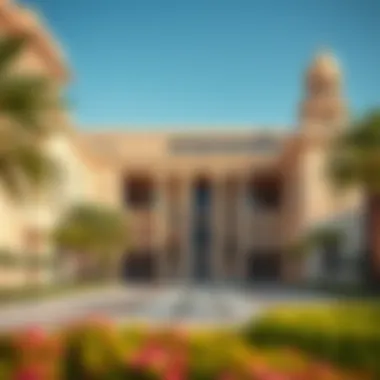
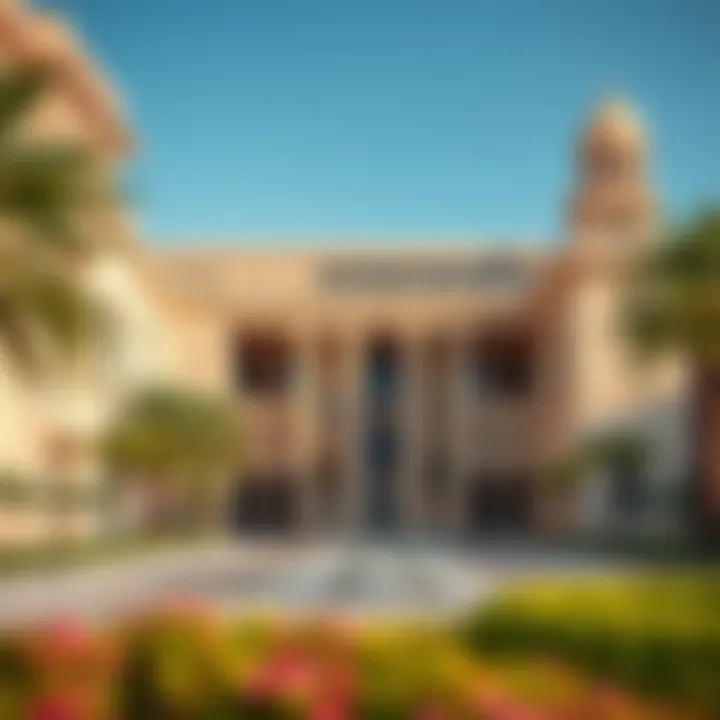
However, the varied quality of implementation across different schools can be a major drawback. Certain schools might excel in areas like sports or arts, while others might not provide equal opportunities, prompting families to conduct thorough research before making choices.
International Baccalaureate
The International Baccalaureate (IB) is particularly noteworthy for its holistic education philosophy. While it shares elements with the conventional IB Curriculum, its high school diploma focuses on preparing students not only for further studies but also for life in a global society. Its comprehensive approach includes theory of knowledge, which encourages students to reflect on the nature of knowledge across various disciplines.
The significant advantage of the International Baccalaureate is its international recognition by universities, facilitating smoother transitions for students intending to study abroad. Yet, the intense focus on critical analysis and collaboration can be daunting for some, especially those who may prefer more traditional learning methods.
School Facilities and Resources
Proper facilities and resources can influence the quality of education. Schools equipped with modern labs, libraries, and sports facilities tend to provide a more engaging learning environment. It's essential to consider whether a school has access to technology, such as smartboards and e-learning platforms, which can enhance student engagement and participation.
Furthermore, outdoor facilities, art studios, and athletic fields can also play a crucial role in a child’s development. Access to these resources often translates into a more rounded education, catering to not just academic needs but also to physical and creative growth.
Teacher Qualification and Experience
The quality of teaching staff is paramount to any evaluation of a school. Well-qualified, experienced teachers not only provide a higher standard of education but instill a culture of inquiry and creativity. A school’s commitment to ongoing professional development for its teachers can be a distinctive benefit, fostering an innovative teaching environment.
In summary, assessing schools based on the aforementioned criteria is integral in making sound judgments on educational institutions in Dubai. Parents invested in their children's education must pay close attention to these factors to ensure the best possible fit for their individual needs and aspirations.
Top International Schools in Dubai
When it comes to selecting a school in Dubai, top international schools often stand out in the crowded field of educational institutions. For expatriate families and locals alike, these schools embody a blend of global curricula, diverse student bodies, and robust extracurricular offerings. The high stakes of educational choice in a cosmopolitan city like Dubai necessitate a thorough examination of these schools, as they significantly shape future pathways for students. The focus on individual development, tailored learning experiences, and world-class facilities makes these institutions worth considering.
School One: Overview and Strengths
Curriculum
The curriculum at School One is particularly noteworthy. It emphasizes a student-centered approach, integrating project-based learning just like a tree with branches reaching out in all directions. This feature allows every student to explore their interests extensively. The school's incorporation of the British Curriculum adds a recognizable framework and ensures a solid academic foundation. Furthermore, this curriculum is prevalent among expatriate families, drawing many parents who are familiar with its format from their home countries. While a challenge may be the preparation for standardized testing, the overall structure supports holistic development, setting a strong stage for academic excellence.
Achievements
When we talk about achievements, School One shines like a well-polished diamond. Recent accolades showcase its commitment to academic and social excellence. This school does not just focus on test scores; it encourages community engagement and personal development, which are vital for lifelong success. A unique feature lies in its strong partnerships with universities, gardening pathways for students who embark on higher education. However, the intense pressure to excel can also be perceived as a double-edged sword. Balancing ambition with well-being remains a challenge for many students.
Facilities
The facilities at School One are top-notch, combining modern design with functionality. Spacious classrooms, dedicated science labs, and creative art studios provide students with an engaging learning environment. Additionally, sports facilities promote a strong emphasis on physical education, fostering teamwork and resilience. Yet, the downside might be the limited accessibility for some students due to high fees associated with premium facilities, raising questions about equality in educational access.
School Two: Overview and Strengths
Curriculum
School Two adopts the International Baccalaureate program, which is like a gold star on the educational map. This curriculum prepares students for a global society by encouraging critical thinking and intercultural understanding. The program is rigorous and intellectually stimulating, making it an attractive option for ambitious families. The focus on inquiry-based learning promotes a deep understanding of subjects rather than rote memorization. On the flip side, the demanding nature of the curriculum can lead to stress, placing additional pressure on students and parents alike.
Achievements
Achievements at School Two extend beyond academics. Their students often represent the school in various local and international competitions and regularly secure top spots. The global networking opportunities fostered through the IB diploma are also significant, presenting students with paths toward prestigious universities. However, an area of concern could be the overly competitive environment, which might overshadow individual student accomplishments.
Facilities
Among the highlights at School Two are its state-of-the-art facilities. With modern classrooms designed for collaboration and advanced technology integration, students experience learning in a contemporary context. The campus also features extensive outdoor spaces, promoting well-being. Nevertheless, one of the unique challenges is maintaining these facilities, which requires sustained financial investment, often reflected in tuition costs.
School Three: Overview and Strengths
Curriculum
School Three stands out with its American Curriculum, a clear and structured path that students from varied backgrounds can follow comfortably. The curriculum offers a broad selection of subjects, allowing students to tailor their education to their interests. This flexibility fosters a love for learning, creating an inviting atmosphere for exploration. The approach is typically more adaptive, catering to different learning styles. However, one aspect to consider is the potential inconsistency in educational standards across states, since it’s based on a framework that varies nationwide.
Achievements
Achievements of School Three are reflective of its commitment to excellence. Students consistently achieve high scores on a range of assessments, including Advanced Placement courses, enhancing their chances for advanced standing in higher education. The school takes pride in its emphasis on volunteerism, encouraging students to engage with and contribute to the local community. This balance between academic success and social responsibility is appealing, yet the increasing focus on grades may unintentionally leave lesser-involved students feeling undervalued.
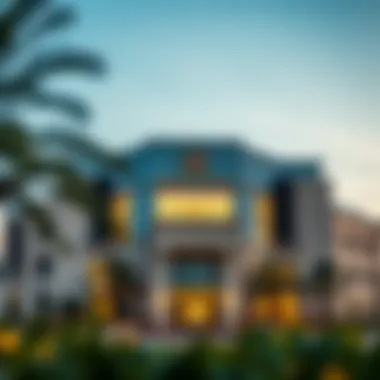
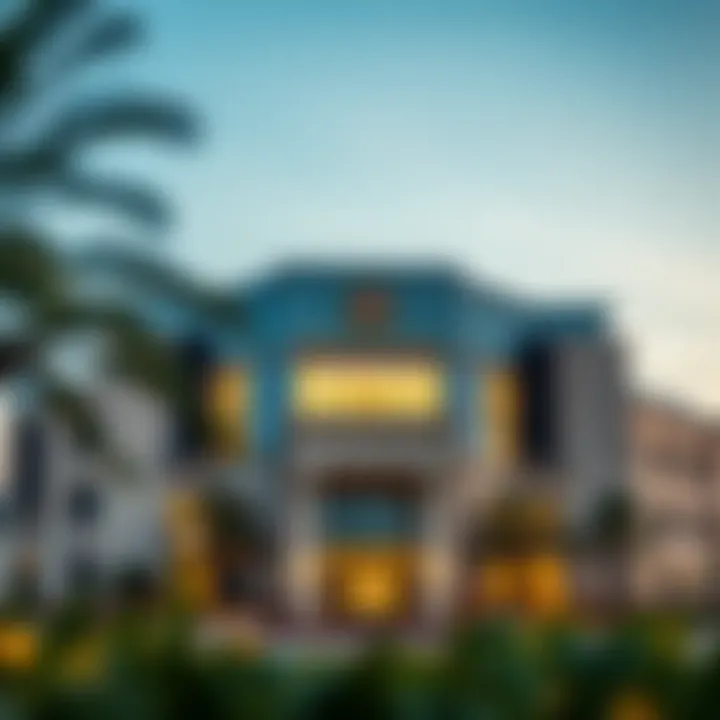
Facilities
The facilities at School Three emphasize comfort and innovation. Classrooms are equipped with the latest technology, and there are ample extracurricular areas for sports, arts, and general activity. The library is state-of-the-art with resources to support various interests. A downside could be the wear and tear that facilities endure due to high usage, which sometimes outpaces the ability to maintain them. This concern raises questions about how well resources are allocated in fostering a conducive learning environment.
Private School Choices
When considering education for their children, many families in Dubai might lean towards private schools due to the diverse learning environments and curriculums they offer. This section discusses the choices within this category, focusing on two significant aspects—affordability and feedback from parents and students. Understanding these components is crucial, especially for parents who aim to make informed decisions about their child's education.
Affordable vs. Premium Institutions
In Dubai, the landscape of private schools varies greatly in terms of cost. Families often find themselves weighing the options between affordable institutions and premium ones.
Affordable schools, often catering to a broader demographic, can provide a solid education without breaking the bank. These schools typically offer the same core curriculums found in more expensive institutions, such as the British or American systems, but at a lower price point. However, it’s important to effectively evaluate the quality of education, teacher qualifications, and resources available in these settings.
On the flip side, premium institutions boast various benefits but come at a steeper cost. These schools often highlight well-resourced learning environments, state-of-the-art facilities, and extended extracurricular options. The investment in premium education can lead to greater opportunities for children, especially when considering networking and advanced program access. However, the financial commitment can be a substantial factor, prompting parents to consider if the higher fees translate to significantly better outcomes.
Parents must consider what they value most—whether it's cost-effective education or an enriching environment that comes with a higher price tag. The choice ultimately hinges not just on finances but also on the specific needs and aspirations of the child.
Parent and Student Testimonials
One of the best ways to gauge the quality of a school is through the lens of those directly involved—parents and students. Testimonials often provide heartfelt insights and can be very persuasive.
For instance, Parent satisfaction can speak volumes. Many parents express concerns over educational standards, and hearing words from those who have experienced a particular school can alleviate worries or solidify confidence.
"I never thought I'd find a school where my son not only excelled academically but also found his passion for sports. The environment is nurturing yet challenging. Made the right choice!" — Mother of a Year 10 student at an affordable school.
On the student side, feelings about the school's atmosphere, peer interactions, and overall satisfaction play an integral role in determining the success of their educational experience. Students often report reaching significant personal milestones that contribute to their development, beyond just grades. Their sense of belonging can often make or break their school experience.
Overall, a careful review of testimonials alongside a thorough assessment of school offerings can offer invaluable perspectives. Parents considering private school options in Dubai are encouraged to actively seek out these views, as they can help navigate their choices more effectively.
Exploring both the array of affordable and premium institutions along with authentic testimonials provides a well-rounded picture, empowering parents to make meaningful decisions about their child's educational journey.
Public School System in Dubai
In a city renowned for its diversity and rapid development, the public school system in Dubai plays a crucial role in shaping future generations. Understanding this system offers valuable insight for parents and guardians, particularly those who are savvy about educational needs. With a host of benefits, the public schools cater to various demographics, emphasizing inclusivity and accessible education.
Structure and Governance
The governance structure of public schools in Dubai is largely overseen by the Knowledge and Human Development Authority (KHDA). This governmental body ensures that public institutions meet the educational standards outlined by the Dubai government. This oversight leads to a cohesive framework where educational policies are uniformly applied.
Public schools in Dubai primarily serve the local population and are structured to reflect the values and culture of the UAE. Each school operates under a specific set of guidelines which are designed to maintain a high standard of education and to foster skills necessary for a modern economy. Here are some key aspects:
- Centralized System: Instead of allowing every school to operate independently, a centralized governance system helps in regulating curricula and ensuring consistency.
- Public Funding: These institutions receive financial support from the government, making education more accessible to local families.
- Cultural Integration: Schools are designed to incorporate local customs and traditions into their daily practices, promoting cultural awareness and respect.
This structure not only enhances administrative efficiency but also ensures that students receive a rounded education that is aligned with national interests.
Curricular Focus and Standards
Curricular standards in public schools in Dubai are set high, aiming to provide students with a robust academic grounding. The focus is often on the Emirati curriculum, which integrates subjects that reflect both local culture and global standards. The teaching approach in public schools emphasizes a blend of theoretical understanding and practical skills.
Key aspects of the curricular focus include:
- Language Proficiency: Both Arabic and English are taught, reflecting the city's diverse linguistic landscape.
- STEM Education: A strong emphasis on science, technology, engineering, and mathematics prepares students for a future where these skills are critical.
- Civic Education: There is a clear focus on instilling a sense of civic responsibility and knowledge of rights and duties among students.
The effectiveness of public school standards can often be seen in national assessment results, which provide evidence that the system works well for its student population. Reports suggest that students significantly improve their competencies as they progress through school, which is a testament to the quality of education provided.
"A strong public education system is essential for a nation's progress, as it shapes informed and responsible citizens who can contribute positively."
Regulatory Framework for Educational Institutions
The regulatory framework governing educational institutions in Dubai plays a pivotal role in shaping the educational landscape. It ensures that schools meet specific standards, fostering an environment conducive to effective learning. For parents and guardians, understanding this framework is key to making informed decisions about schooling options. It encapsulates various aspects, from governmental oversight to accreditation processes, which influence the quality and effectiveness of education in this region.
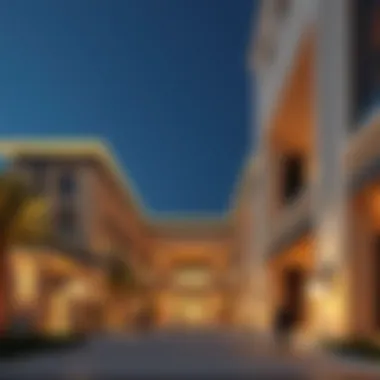

Governmental Oversight
Government oversight in Dubai's educational sector is complex and multifaceted. The Knowledge and Human Development Authority (KHDA) serves as the backbone of regulatory mechanisms, supervising private schools and promoting educational excellence. This body ensures that educational institutions adhere to national policies and maintain standards that align with the UAE's vision for education.
The KHDA conducts regular inspections, providing parents with comprehensive reports on school performance. This transparency aids in comparing schools and choosing the right fit for a child's needs. Moreover, it holds institutions accountable for the quality of education they deliver. Such oversight not only augments educational standards but also encourages schools to innovate and improve continually.
In recent times, there has been a focus on enhancing parental engagement, thereby creating a community-centered approach to education. Regulations emphasize the need for schools to involve parents actively in the educational process, fostering a more holistic approach to student development.
Accreditation Processes
Accreditation is the gold standard that sets educational institutions apart in Dubai. It acts as a quality assurance mechanism, validating the school's curriculum, faculty qualifications, and overall standards. Educational institutions undergo a rigorous process to attain accreditation from relevant bodies, such as the Council of International Schools or the Middle States Association of Colleges and Schools. This not only boosts a school's credibility but also enhances its attractiveness to expatriate families seeking reliable education for their children.
Accredited schools typically demonstrate a commitment to educational excellence and ongoing improvement. They must regularly submit to evaluations that assess various facets, including teaching methodologies, student outcomes, and administrative practices. Schools that achieve and maintain accreditation often enjoy higher enrollment rates, reflecting trust from parents and the community.
"Accreditation is not just a badge; it's a commitment to continuous improvement and student success."
Overall, the regulatory framework and its corresponding processes—governmental oversight and accreditation—work hand in hand. This collaboration ensures that educational institutions in Dubai strive for excellence, ultimately benefiting students and their families. It underscores the importance of quality education in nurturing the future leaders of tomorrow.
The Role of Technology in Modern Education
In today’s fast-paced world, technology has carved a significant niche in the realm of education, notably in a cosmopolitan hub like Dubai. It transforms traditional methods of teaching, making education more engaging, accessible, and efficient. Understanding the role technology plays is essential for assessing modern educational institutions in Dubai. From interactive learning to personalized education paths, technology opens up a myriad of opportunities that were previously unimaginable.
The presence of a diverse expat community in Dubai means schools must cater to various educational needs, blending curricula with technological advancements, thus creating a multifaceted learning environment. Emerging technologies equip students and educators alike with the tools required for success in an increasingly digital world.
E-learning Platforms and Tools
Dubai has become a hotbed for innovative educational technologies. E-learning platforms are thriving, catering to both students and teachers. Tools like Google Classroom or Microsoft Teams have transformed classrooms into collaborative hubs, allowing students to access resources and communicate effortlessly. These platforms are not just convenient; they also provide a wealth of resources—interactive modules, video lessons, and extensive libraries—that can cater to different learning styles.
Moreover, the use of educational software tailored to specific subjects is increasing among schools. For instance, platforms like Khan Academy and Coursera provide students with supplementary materials that reinforce classroom learning.
"The accessibility of online resources means that education is no longer confined to the four walls of a classroom."
Teachers benefit too; they can monitor progress through analytics, adjust teaching strategies, and provide immediate feedback. An increasing number of schools in Dubai are incorporating these tools into their day-to-day operations, leading to improved student outcomes and engagement.
Impact of Digitalization on Learning
Digitalization has reshaped the educational landscape comprehensively. It allows for the customization of learning experiences. For instance, adaptive learning technologies can adjust to a student's pace and grasp of concepts, ensuring that no one is left behind. This tailored approach is particularly beneficial in a multicultural environment where students may have varying degrees of familiarity with the language and curriculum.
Furthermore, technological integration within classrooms fosters vital skills like critical thinking, creativity, and collaboration. These skills are not just buzzwords; they are essential for preparing students for future job markets. As industries globally continue to evolve with the integration of artificial intelligence and digital tools, the importance of equipping students with these skills cannot be understated.
Future Directions for Education in Dubai
In considering the future landscape of education in Dubai, one can see the ebb and flow of change shaped by a myriad of influences. The increasing globalization of knowledge, coupled with the city’s ambition to be a world-class educational hub, makes this exploration crucial. Parents, investors, and expatriates need to grasp how evolving trends will influence their choices and opportunities in Dubai’s educational institutions.
Integration of Global Learning Standards
One prominent element in shaping the future of education in Dubai is the integration of global learning standards. Schools across the emirate are beginning to adopt guidelines of recognized international frameworks, allowing educators to align their curricula with best practices around the world. This shift is not just a formality; it has far-reaching implications for educational quality and student success.
Benefits of this integration include:
- Enhanced Learning Outcomes: By aligning with global standards, schools can help students achieve higher levels of critical thinking and problem-solving skills.
- International Recognition: Institutions that adopt these standards often receive better accreditation, making their qualifications more recognized worldwide.
- Increased Mobility: Families moving within the global expat community will find an easier transition for their children, thanks to a uniform educational approach.
Moreover, schools are increasingly fostering partnerships with international organizations. For instance, collaborating with entities like the International Baccalaureate enhances not just the curriculum but also the credibility of the institution.
According to the Knowledge and Human Development Authority (KHDA), aligning Dubai’s education system with global benchmarks is integral to building a competitive workforce.
Emerging Educational Trends
As the educational landscape in Dubai transforms, so too do the trends shaping its future. The demand for innovative teaching methods and technologies is palpable, driven by both local needs and global advancements.
Key emerging trends include:
- Personalized Learning: Schools are moving towards personalized education that caters to individual learning styles and paces. This is made possible through data analytics and sophisticated learning management systems (LMS).
- STEM and STEAM Initiatives: An increasing focus on Science, Technology, Engineering, Arts, and Mathematics is necessary to prepare students for the jobs of tomorrow. Many schools are introducing projects and extracurricular programs to encourage students’ interests in these fields.
- Mindfulness and Wellbeing: Addressing mental health and emotional well-being is becoming a priority. Schools are adopting programs that promote mindfulness practices, ensuring that education goes beyond the classroom.
The outlook for Dubai's educational sector is promising, yet it faces challenges. As trends evolve, institutions must remain flexible, adapting to the needs of a multicultural student body while maintaining educational excellence. The choices made today will shape the landscape of learning tomorrow, influencing how the broader community engages with education in Dubai.
As we forge ahead, it’s clear that a proactive approach will be necessary for stakeholders to navigate the intricate web of educational possibilities. Understanding these future directions will empower parents and guardians to make informed decisions for their children's education.



